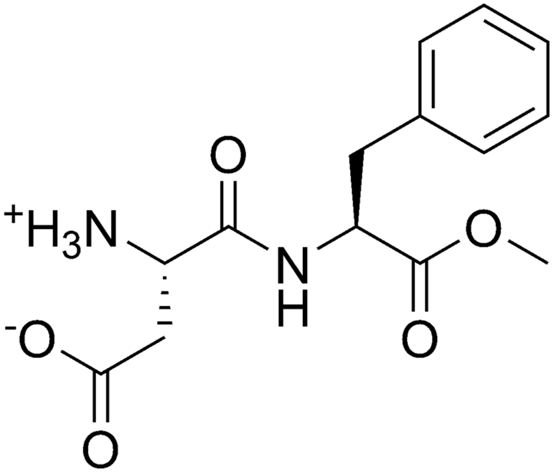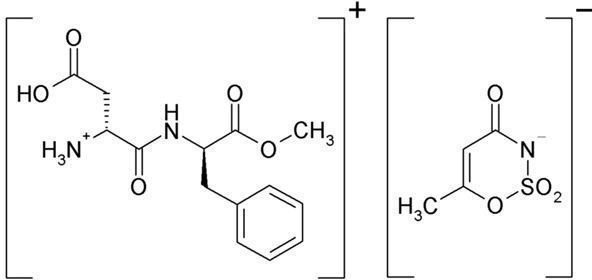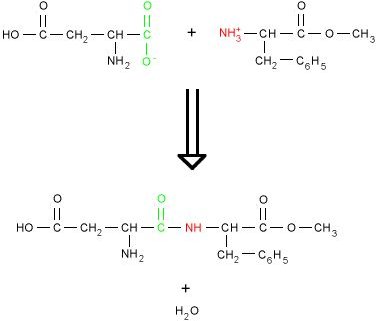What is Aspartame & Is It Bad for You?
Overview
Aspartame is an artificial sweetener that has been around for many years. It was first approved for use in beverages in 1983. Known by the brand names NutraSweet and Equal, the content of this little blue packet are not as safe as the public thinks. Originally designed to be a replacement to cyclamates and saccharin, the safety of aspartame, especially in diet drinks has been continually under fire.
Molecualr Structures of Aspartame


What is Aspartame?
Aspartame is made up of 50% phenylalanine, 40% aspartic acid and 10% methanol. Phenylalanine and aspartic acid are amino acids. The body requires these in very small amounts in order to maintain normal function. They are never found isolated from each other in nature. Naturally occurring, these two amino acids are molecularly linked. Methanol is commonly known as wood alcohol. It is toxic to humans. Certain types of race cars use methanol as fuel.
Aspartame is used in many foods and beverages as a non-nutritive artificial sweetener. It is advertised as a zero calorie sweetener but this is not exactly true. The majority of aspartame in the US is found in diet beverages such as diet soda and juices. Chewing gum almost always contains aspartame. It is commonly found in yogurt and other low calorie foods.
History of Aspartame
Aspartame was discovered in 1967 by James Schlatter of the G.D. Searle Corporation while he was researching a drug for the treatment of peptic ulcers. Testing on aspartame continued until 1974 when G.D, Searle was granted FDA approval for restricted use.
In 1977 the FDA launched an investigation into G.D. Searle Corporation’s manipulation and possible falsification of test data in regards to obtaining FDA approval of aspartame. The US Attorney’s Office was in charge of the investigation. Samuel Skinner was the US attorney in charge of this investigation. He later left the US Attorney’s Office and was hired by Sidley and Austin, the law firm defending G.D. Searle in the aspartame investigation. G.D. Searle was never found to have committed any wrong doing.
Unable to gain further approvals and still under government scrutiny, G.D. Searle hires a new CEO in 1981. His name is Donald Rumsfeld. This is the same Donald Rumsfeld of the Bush Administration. Rumsfeld uses his powerful political ties with the Regan Administration and gets full approval for aspartame for use in beverages and dry goods in 1983. The National Soft Drink Association was opposed to this approval.
G.D. Searle owned the patent to aspartame from 1965 through 1998. It was then bought out by Monsanto which divided the sweetener division into two companies, one dealing with NutraSweet and the other became Equal.
Known Problems with Aspartame
The first issue with aspartame as a sweetener is in beverages. When in liquid form, aspartame is not heat stable and readily breaks down into DKP which is a carcinogen and formaldehyde. The dangers of formaldehyde are commonly known. It stays in fatty tissue in the body and is not readily released. Over time this can result in cancer and other health issues.
Methanol is another issue with aspartame. Methanol poisoning is serious and the medical community is aware of the dangers of methanol poisoning. Drinking or consuming methanol is highly toxic to humans. Aspartame contains methanol without pectin or ethyl alcohol. This is not a naturally occurring event.
Naturally occurring methanol is usually bound to pectin (fiber) and ethyl alcohol always occurs with it. Bound to pectin, methanol passes harmlessly through the body. Ethyl alcohol (the same as in beer and wine) counteracts the effects of methanol on the body. Aspartame is void of pectin or other dietary fiber. There is no ethyl alcohol in aspartame. The body is left with no choice other than to breakdown the methanol into formaldehyde.
Since the introduction of aspartame in diet beverages the CDC has been flooded with complaints about health issues concerning diet sodas. Some of these complaints include: headaches and migraines, dizziness, moodiness, nausea and vomiting, abdominal cramping, changes in vision, convulsions and seizures, respiratory problems, cardiovascular problems, anemia, and death. Aspartame is the primary cause of all of these symptoms.
Problems with the controlled studies used to determine the safety of aspartame can be found in the Bressler Report.
Conclusions
The safety of aspartame cannot be confirmed. As with many other artificial sweeteners, the FDA allowed approval even though there is compelling evidence to the contrary. It is up to consumers to educate and protect themselves. Maybe you should rethink taking another sip of that diet soda.
